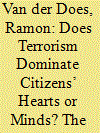| Srl | Item |
| 1 |
ID:
109907


|
|
|
|
|
| Publication |
2012.
|
| Summary/Abstract |
Understanding the determinants of consumers' acceptance towards genetically modified food (GMF) is critically important for the biotechnology industry. Based on a unique data set collected by the authors in 2002 and 2003 in 11 cities of China, an econometric model of consumers' acceptance of GMF is estimated. The results show that consumers' acceptance of GMF is high in urban China and consumers' trust in government has a significantly positive effect on consumers' acceptance of GMF. Our study also shows that failure to consider the endogeneity of consumers' trust in government will lead to serious underestimation of its impacts on consumers' acceptance of GMF. This is, to the best of our knowledge, the first study on the impact of consumers' trust in government with consideration of the endogenous problems that often are encountered in consumer perception studies.
|
|
|
|
|
|
|
|
|
|
|
|
|
|
|
|
| 2 |
ID:
183013


|
|
|
|
|
| Summary/Abstract |
Terrorism only poses a small risk to people but tends to be a major source of public fear. Through fear, terrorism has far-reaching implications for public governance. In this paper we look at trust in government as a potential mitigating factor of fear of terrorism. We discern between calculative trust, based on analytical assessment of previous and expected future actions, and relational trust, based on emotions and perceived value similarity with government. We find that relational trust decreases fear of terrorism. A similar but less robust negative relationship exists between calculative trust and fear. However, our regression analyses suggest that relational trust, in fact, may mediate the relationship between calculative trust and fear of terrorism. In other words, the more citizens think government is able to prevent terrorist attacks and feel that authorities are doing enough, the more they, in turn, feel that their government shares their values, and the less fearful they are of future terrorist attacks.
|
|
|
|
|
|
|
|
|
|
|
|
|
|
|
|